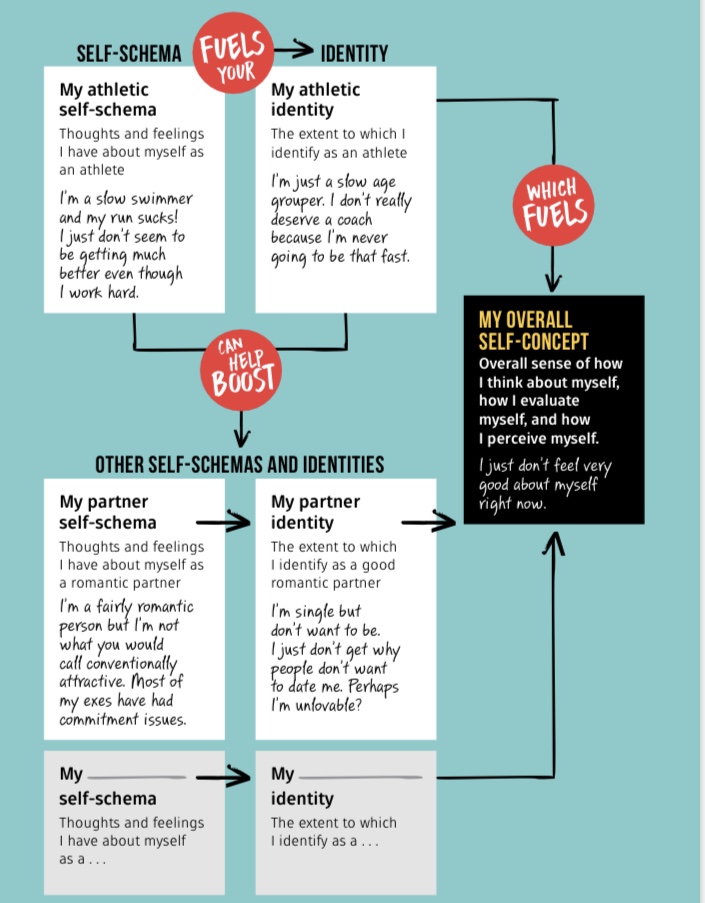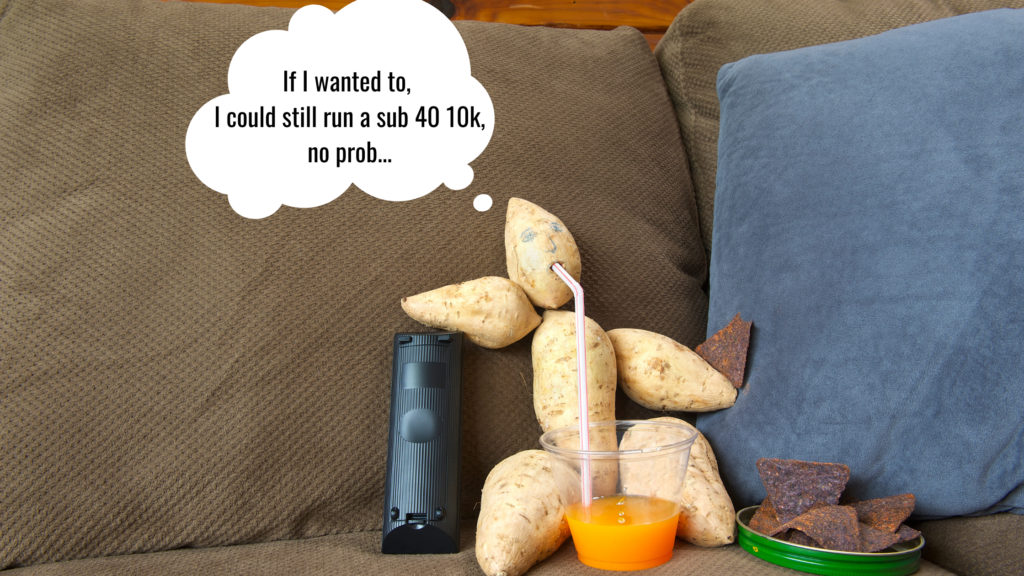Inspired by the teachings in ‘The Brave Athlete: Calm the F*ck Down and Rise to the Occasion’ by Simon Marshall, PhD & Lesley Paterson
I just ran the worst 10k race of my life, and I’m okay with it. I am in the process of rebuilding my athletic identity. My athletic identity is how I identify with the ‘athlete’ role and look to others for acknowledgement of that role. If you think any of the below, or anything in between about yourself, you have an athletic identity:
‘I am not an athlete.’
‘I used to be an athlete.’
‘I’d like to be an athlete one day…’
‘I’m a pretty decent athlete…’
‘I’m a competitive athlete, but not a pro.’
‘I’m one of the best (x) athletes in the world.’
Our athletic identities are shaped by our previous experiences, our peers, and our overall sense of self.
If you had unathletic parents, limited athletic experiences growing up, and/or currently don’t engage in or watch any sports, it’s possible to be aschematic about your athletic identity.
If you were happy with your athletic identity but succumbed to an injury, it can feel like your athletic identity has been stripped from you. You can find yourself in a pity party- comparing yourself to the athlete you used to be.
If you don’t perform well and blame your coach or teammates even though you only stick to half of your training plan, you my soon-to-be disillusioned friend, have an athletic identity mismatch.
So what? Why does our athletic identity matter?
It’s part of our self-schema (our overall thoughts about ourselves and how we think others perceive us). We have self schemas about many areas of our lives. The type of romantic partners we are, the type of co-worker we are, the type of friend we are… Our self schemas all add up, and interact with each other to create our overall self concept. Our athletic identity can influence our other identities which ultimately shape our lives.

‘Your self schema shapes your expectations of what you think you can do, what you attempt and what you persist at. How you explain your success and failures and how you want others to see you in other areas of life.’ Lesley Paterson

Improving the way we feel about ourselves as athletes, can have a positive effect on other areas of our life. For example, if we identify as an athlete, we are more likely to understand how important it is to generate energy. We will likely eat well regularly, sleep well, drink plenty of water, fuel for training. A mature athletic identity can also fuel confidence, grit, contentment and a healthy dose of competitiveness.
“We don’t see things as they are, we see them as we are” ANAÏS NIN,
There isn’t a cookie cutter solution to rebuilding an immature, aschematic, or mismatched athletic identity, different strategies will work for different people.
I identify as an athlete. I recently ran the slowest 10k race of my life.
I made all of the excuses. ‘It wasn’t a real race, I started too late, I chose a difficult route, my shoes were too big, It was too hot, I didn’t really try, I could have done it faster’… I said all of those things knowing that I didn’t properly prepare for the race. I didn’t stick to a training plan, I had pizza and beer the night before. I didn’t check the weather… I said ‘I can’t do this’ and I quit when it got hard. I was too embarrassed to share my time (it was 45:11) and potentially damage my identity as a serious athlete, for myself and others.
So how can I rebuild my athletic identity?
I’m going to focus on process goals not outcome goals.
Instead of dwelling on how much faster I used to be, and all of the things I used to do better, I am going to outline the things that I could have done better and focus on improving those consistently. (training, mobility, recovery, energy: nutrition, sleep)
I am going to periodize my training and accountability partners.
Always training with better athletes can be demoralizing, the same way that always training with lesser athletes can give us a false sense of confidence.
I am going to run intervals and threshold runs with faster runners and use my easy days to guide blind runners and catch up with my recreational runner friends. Hard days: hard & easy days: easy.
I’m not training my body for the athlete I am today, I am planning for the level of athlete I can/should be.
- Train = Move Better
- Recover = Feel Better
- Fuel = Live Better
- Perform = Be Better
With consistency and patience, I will become a better athlete and as a result, I will become a better overall version of myself.
Who’s with me?
References
(Brewer, Van Raalte, & Linder, 1993)
The Brave Athlete: Calm the F*ck Down and Rise to the Occasion eBook: Marshall, PhD Simon, Paterson Lesley

